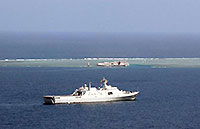Chinese watch US presidential race with curiosity
By Chen Weihua (chinadaily.com.cn) Updated: 2016-08-01 11:16US presidential elections often draw global attention. This is not only because many countries highly regard their bilateral relations with the US, but they also believe the leadership of the world's only superpower bears global consequences.
This has been true for China as reflected in the amount of news in the Chinese media about the 2016 race. Chinese journalists were quite visible in covering the 2016 primaries, and the Republican National Convention in Cleveland on July 18-21 and Democratic National Convention in Philadelphia on July 25-28.
It is not hard to see the reasons for such interest. The China-US relationship has become increasingly interdependent and at the same time complex — both cooperative and competitive.
The fact that China has become a bogeyman in US presidential campaigns over the years has angered many Chinese. The fact that the candidates have chosen to attack China on the economic and trade front suggests to many Chinese that China has been doing relatively well in that regard — lifting 600 million people out of poverty, building infrastructure and growing its economy to be the second-largest in the world in a matter of a few decades. People still remember how Japan, albeit a US ally, also became a target when it soared to become the world's second-largest economy in the 1990s.
As a candidate endorsed by President Barack Obama, Hillary Clinton, the Democratic nominee, is constrained from criticizing the status quo too much because it would be seen as disapproval of Obama's nearly eight years of presidency. This despite the fact that the American public is deeply dissatisfied with the direction the nation has been going, according to various polls.
Blaming other nations for US problems has been a strategy for both candidates. In her acceptance speech last Thursday, Clinton said, "If you believe we should say ‘no' to unfair trade deals… that we should stand up to China… that we should support our steelworkers and autoworkers and homegrown manufacturers… join us."
She mocked Trump saying, "Please explain to me what part of America First leads him to make Trump ties in China, not Colorado; Trump suits in Mexico, not Michigan; Trump furniture in Turkey, not Ohio; Trump picture frames in India, not Wisconsin?"
Trump, in his acceptance speech on July 21, vowed to stop "China's outrageous theft of intellectual property, along with their illegal product dumping, and their devastating currency manipulation," adding that "our horrible trade agreements with China and many others will be totally renegotiated."
Yet Trump said in Denver on Friday that "China is great. I love China. I do business with China," noting a Chinese bank was his tenant in Manhattan and other partnerships. "We can do great with China. But we have stupid people representing us, stupid, stupid people,"
While Trump's campaign seemed a joke six months ago to many Chinese (just as to many Americans), many Chinese now prefer Trump over Clinton in their pick of the lesser of two evils. This has been shown in a Phoenix TV online poll two months ago, as well as among the many fellow Chinese journalists covering the DNC and RNC.
Trump's less interventionist foreign policy resonates with Chinese who are upset with the Libyan intervention conducted by the US and its NATO allies while Clinton was secretary of state. In 2011, the US and its NATO allies abused UN Security Council Resolution 1973 to pursue regime change in Libya, angering both China and Russia and causing a mess in the Mideast.
Many Chinese also hold Clinton liable for the tensions between China and some of its neighbors because many of her talks about China in countries from Southeast Asia to Africa had been seen as trying to drive a wedge between those nations and China.
Covering the conventions is a good opportunity to see US democracy in action, yet many fellow Chinese journalists I talked to have felt disappointed, pointing to the six to seven hours of tirades every day glorifying the party candidate and defaming the opponent from the other party.
This, coupled with things like the official Clinton poster, in which she looks 20 years younger and has red and gold rays radiating from her, is a reminder of the cult of personality in US history.
Instead, many have been impressed by the passion of the Bernie Sanders supporters, both in the arena and on the streets, following the leaked email revelation that the Democratic National Committee staffers rigged the primary to favor Clinton over Sanders.
To many curious Chinese, this was not something associated with a well-functioning democracy.
Contact the writer at chenweihua@chinadailyusa.com.






